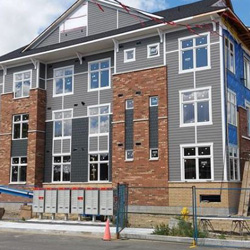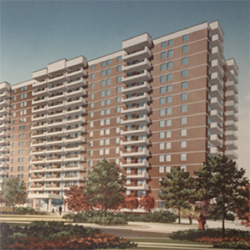The information that follows comes from a legal opinion prepared by David H. Hill, C.M., Q.C of Perley-Robertson, Hill & McDougall. It was commissioned by the former Ontario Tobacco-Free Network, a provincial interagency network consisting of the Canadian Cancer Society, Ontario Division, the Heart and Stroke Foundation of Ontario and the Lung Association, with input from the Non-Smokers’ Rights Association.
There are various laws that have a bearing on the issue of smoking in residential rental accommodation in Ontario.
The Residential Tenancies Act, 2006 (RTA) details the rights and responsibilities of landlords and tenants of residential premises and provides a means of settling disputes at the Ontario Landlord and Tenant Board.
The RTA does not specifically address smoking. However, it is legal for a landlord to enact a no-smoking policy for some or all units or the entire property. Landlords have the right to impose additional obligations or restrictions on tenants beyond the standard lease agreement, as long as these requirements do not conflict with the Residential Tenancies Act, the Ontario Human Rights Code, or any other federal law.
However, a no-smoking policy would only apply to new tenants signing new leases. Section 38 (1) of the RTA states that if a tenancy agreement for a fixed term has ended and the tenancy has not been renewed or terminated, the landlord and tenant shall be deemed to have renewed it as a monthly tenancy agreement containing the same terms and conditions that are in the expired tenancy agreement. By law, existing tenants who want to smoke in their units would be “grandfathered” (grandparented) meaning they would be permitted to continue smoking in their units for the length of their tenancy.
If a tenancy agreement does not include a no-smoking clause, tenants are allowed to smoke in their units. However, this does not mean that tenants have an absolute right to smoke regardless of others in the building. Section 22 of the RTA states that a landlord shall not interfere with a tenant’s reasonable enjoyment of the unit, which can include doing nothing about second-hand smoke infiltration from neighbouring units.
While the law does not specifically mention second-hand smoke as grounds for a breach of reasonable enjoyment, there are legal cases in Ontario where second-hand smoke infiltration, causing a significant disturbance, has been successfully argued as a breach of reasonable enjoyment.
- Download the Residential Tenancies Act, 2006.
- For more information, visit the Ontario Landlord and Tenant Board.
In Ontario, smoking tobacco and cannabis and vaping any substance is prohibited in the indoor common areas of multi-unit housing including foyers, elevators, stairwells, laundry rooms, corridors, etc. pursuant to the Smoke-Free Ontario Act, 2017 (SFOA). However, the SFOA does not apply in situations where people are sharing “common areas” within private units such as kitchens, living rooms and bathrooms, such as when they rent a bedroom in a house but share a kitchen and bathroom. In certain situations, such as the provision of daycare or home health care, the SFOA recognizes private dwellings as workplaces and smoking may also be prohibited.
The law allows certain types of residences that are also workplaces to provide “controlled areas” (also known as designated smoking rooms) for the use of residents only, provided they are separately enclosed, meet strict ventilation requirements, and are only used by residents who are able to smoke independently. By provincial law, the following types of multi-unit facilities are permitted to have controlled areas:
- Long-term care homes,
- Supportive housing residences
- Retirement homes that provide care
- Psychiatric facilities, and
- Residential facilities for veterans
Hotels and other types of temporary guest accommodations are exempt from the Smoke-Free Ontario Act, meaning that smoking is permitted in private rooms unless the hotel has adopted a no-smoking policy.
Read the Smoke-Free Ontario Act, 2017.
For more information, visit the Ontario government website
The Human Rights Code gives Ontarians equal rights and opportunities on such matters as employment, housing and services. The Code provides protection from discrimination on the basis of race, ancestry, place of origin, colour, ethnic origin, citizenship, creed, sex, sexual orientation, disability, age, marital status, family status, being a recipient of public assistance and record of offences. When there is a conflict between the Code and another Ontario law, the Code usually has priority.
In a housing context, the Human Rights Code contains some provisions of interest concerning smoking and no-smoking policies – sections 2 (1), 11 (1) (a) and 17 (1) and (2). It is possible that a tenant could file an application at the Human Rights Tribunal of Ontario on the basis that the landlord did not take reasonable steps to resolve a problem of second-hand smoke infiltrating his or her unit from a neighbouring unit. A tenant who suffers from a disability that is made worse by second-hand smoke, such as asthma or allergies, could take the position that the landlord has a responsibility to limit or ban smoking in order to accommodate the tenant’s disability.
On the flip side, smoking is not identified in the Code as a ground for protection. In 2007 the Ontario Human Rights Commission (OHRC) published a report on rental housing and human rights, which concluded that “there are conflicting decisions as to whether or not smoking can be considered a disability and whether allowing people to smoke is an appropriate accommodation.” In 2009 the OHRC published Policy on Human Rights and Rental Housing. Section 6.1 deals with smoking, and concludes by stating:
“A housing provider has a duty to explore accommodation requests from tenants with any form of disability. Tenants may also be asked to cooperate and help facilitate the provision of accommodation for themselves, and where appropriate, for their fellow tenants as well.”
However, given the inherent risks associated with smoking, a housing provider may have little or no obligation to accommodate a tenant’s need to smoke when to do so would amount to undue hardship, for example, by negatively affecting the health and safety of other tenants.
This issue of smoking as a disability has been considered a number of times over the years, and Canadian courts have consistently ruled–with one exception–that addiction to nicotine is not a disability. The one exception was a British Columbia Labour Relations Board decision in an employment context. Cominco, a nickel smelter, had banned smoking on the plant site, and while the Board found that the ban discriminated against heavily addicted smokers, it also recognized that the employer’s no-smoking policy was reasonable and was adopted to protect non-smokers from a known hazard. The matter was referred back to the parties to resolve how to accommodate the heavily addicted smokers and Cominco’s smoking ban remains in effect today.
It is important to note that this decision applied to an employment situation. With respect to housing, it is unlikely that an arbitrator or judge would prefer to have tenants be continually exposed to second-hand smoke rather than infringe on someone else’s supposed right to smoke. Just because someone exercises their freedom to smoke does not mean they have an absolute right to smoke.
The key issue is nicotine withdrawal. Even if in the future an adjudicator or judge ruled a tenant’s smoking as a disability, the focus then becomes one of reasonable accommodation by the landlord to the point of undue hardship. This could potentially include the provision of an outdoor smoking area, physical modifications to the smoker’s unit or provision of nicotine replacement therapy, etc.
It should also be noted that a disability designation is individual. If a judge were to rule that a smoking tenant was disabled, it does not mean that all smokers in Ontario would also be recognized as disabled.
- Download the Ontario Human Rights Code.
- Read the Guide to Your Rights and Responsibilities Under the Human Rights Code.
- View the Human Rights and No-Smoking Policies for Multi-Unit Dwellings fact sheet.
- Read more on smoking and human rights case law.
The Canadian Charter of Rights and Freedoms is a bill of rights entrenched in the Constitution of Canada. It forms the first part of the Constitution Act, 1982, and is intended to protect certain political and civil rights of people in Canada from the policies and actions of all levels of government. Examples of such rights and freedoms include:
- The right to life, liberty and security (section 7);
- The right to not be subjected to any cruel and unusual treatment or punishment (section 12);
- The right to equality before and under the law (section 15);
- Freedom of thought, belief, opinion and expression, including freedom of religion (section 2a).
The Charter only applies to government laws and actions (including the laws and actions of federal, provincial, and municipal governments and public school boards), not to private activity such as what is contained in a landlord’s lease. Contrary to the claims of various smokers’ rights groups, the Charter does not provide protection against discrimination as a smoker.
The rights and freedoms listed above were chosen as examples because various Canadian smoke-free laws and policies have been challenged under these sections of the Charter. Judges presiding over these cases have consistently ruled that the Charter does not recognize smokers as a group suffering social, political, or legal disadvantage in our society. Under this legislation smoking is not considered a physical disability, and this has been demonstrated in a handful of cases.
Case Law
There are several examples of case law in Ontario regarding second-hand smoke in multi-unit housing. A few examples are shown below:
Landlord initiated, no policy in place
| Case number | Reason for application | Outcome |
|---|---|---|
| TEL-94801-18 | The Tenant has substantially interfered with the Landlord’s reasonable enjoyment, based on an outburst, smoking and storage. | An order was issued such that the Tenant, guest of the Tenant and/or occupant shall not smoke inside the rental unit or within 9 meters of the house. |
| TSL-91996-18 | Landlord applied for order to terminate tenancy for interfering with reasonable enjoyment of other tenants by smoking tobacco. | The Tenant shall cease and desist and completely refrain from smoking tobacco inside the rental unit and (or) the residential complex. |
| TNL-08483-18 | The Landlord applied for an order to terminate the tenancy and evict the Tenant because the Tenant wilfully or negligently caused undue damage to the premises. | Evidence presented showed that the Tenant has wilfully or negligently caused undue damage to the rental unit and the residential complex by his smoking, and his violent and destructive behaviour in the residential complex. Tenant to pay damages of $1690. |
| TEL-91021-18 | The Landlord applied for an order to terminate the tenancy and evict the Tenant because the Tenant wilfully or negligently caused undue damage to the premises as well as interfere with reasonable enjoyment of other tenants by smoking cannabis. | The tenancy was terminated. The Tenant shall also pay to the Landlord $190.00 for the cost of filing the application. |
Landlord initiated, policy in place
| Case number | Reason for application | Outcome |
|---|---|---|
| TSL-95195-18 | Tenant has been smoking at the building entrance of the rental complex and that this conduct has substantially interfered with the other tenants’ reasonable enjoyment of the residential complex and substantially interferes with a lawful right, privilege or interest of the Landlord or other Tenants. | Smoking at building entrance interferes with other tenants’ reasonable enjoyment and interferes with a lawful right, privilege or interest of the Landlords. Tenancy was terminated. |
| TEL-92263-18 | Landlord applied for order to terminate tenancy for interfering with reasonable enjoyment of other tenants by smoking. | The tenancy between the Landlord and the Tenant was terminated. The Tenant shall also pay to the Landlord $190.00 for the cost of filing the application. |
Tenant initiated, no policy in place
| Case number | Reason for application | Outcome |
|---|---|---|
| SWT-16361-18 | The Landlord failed to prevent second hand marijuana smoke from infiltrating into the Tenant’s unit. This substantially interfered with reasonable enjoyment of the unit by the Tenant. | The adjudicator found the Landlords failed to meet the Landlords’ obligations under subsection 20(1) of the Act to repair or maintain the rental unit and failed to comply with health standards and substantially interfered with the Tenant’s reasonable enjoyment of the premises. The Landlord paid the Tenant $1350 for cost of moving and rent abatement. The total amount the Landlords owe the Tenant is $1,350.00. |






